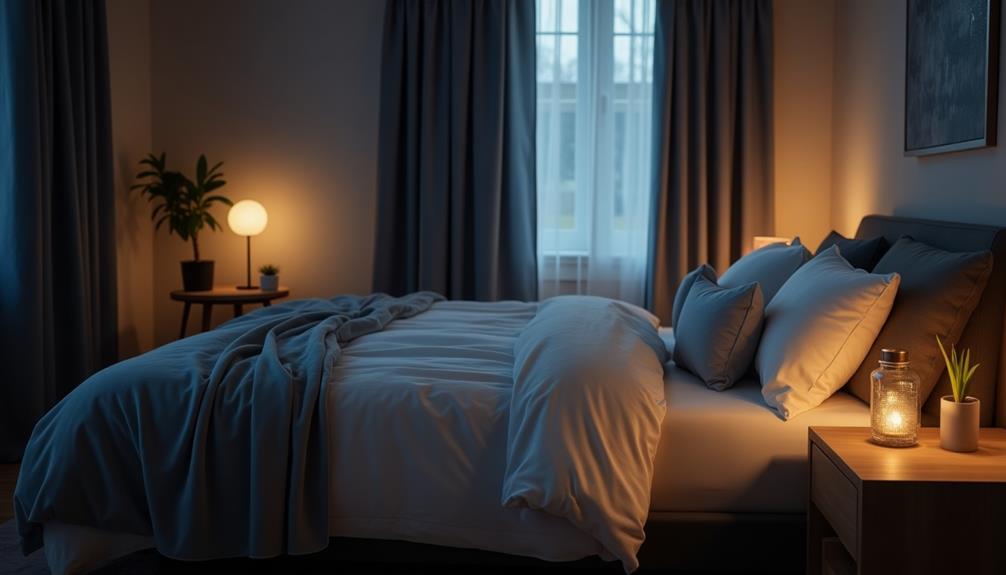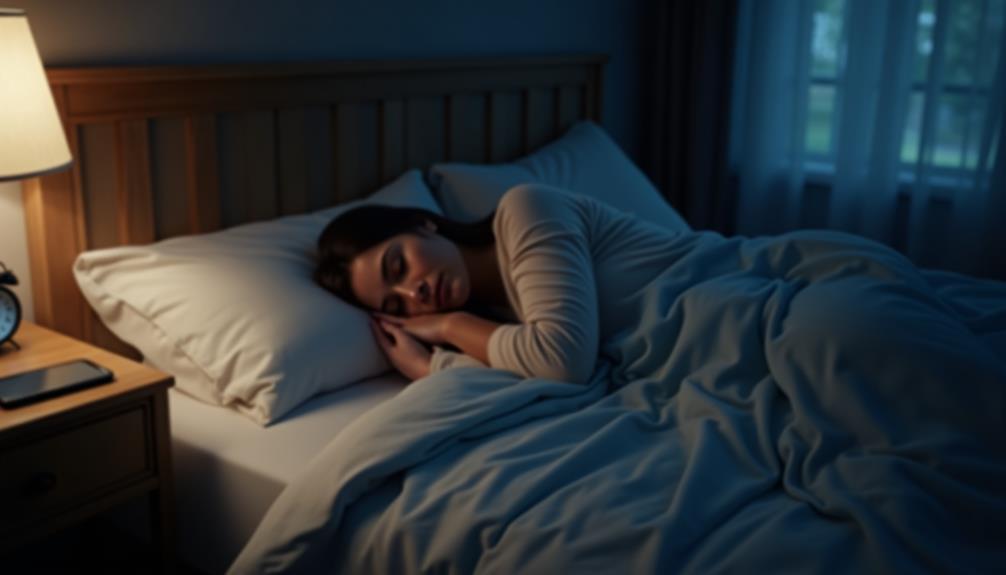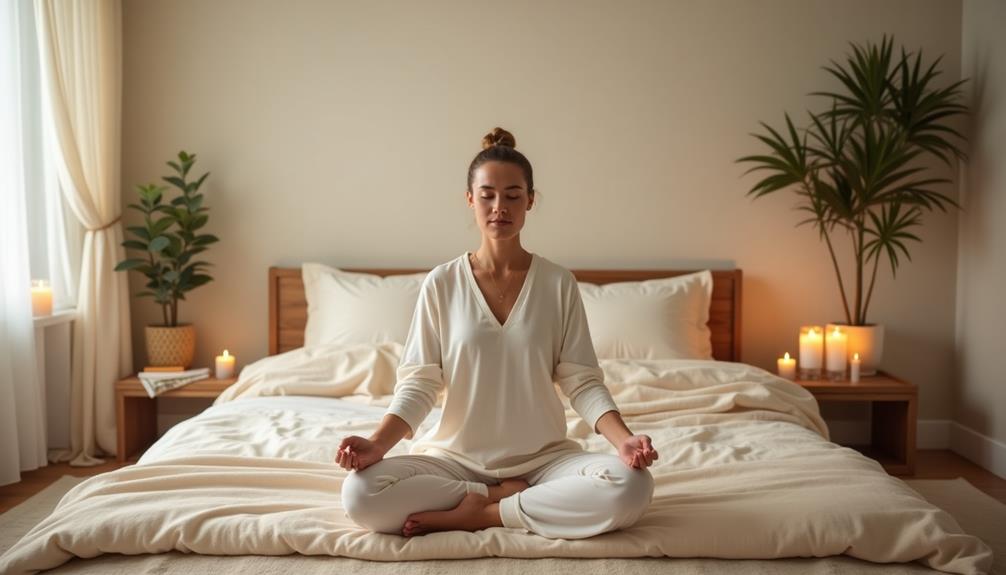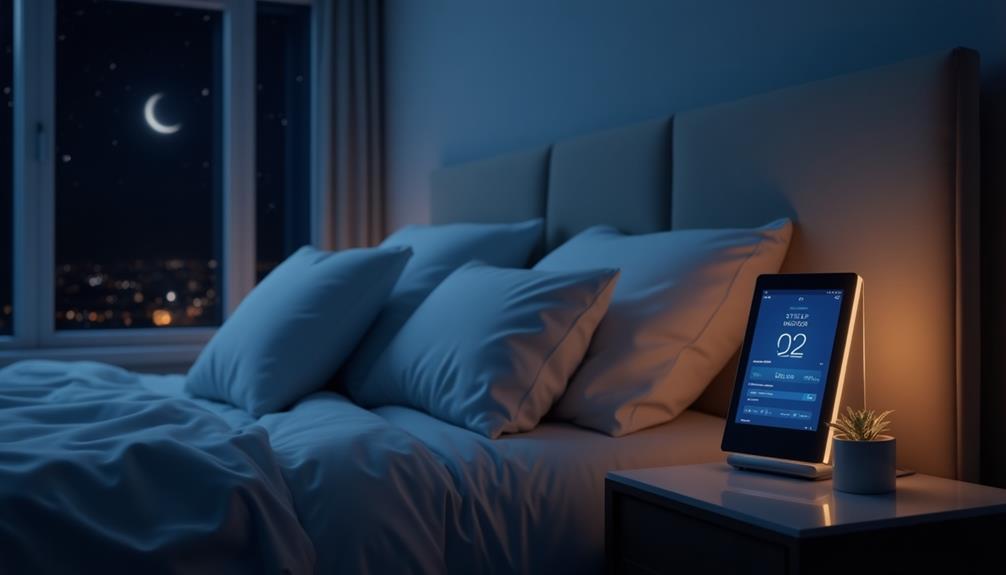Improving your sleep and muscle recovery involves some simple yet effective tips. First, establish a consistent sleep routine—aim for 7-9 hours of quality sleep each night. Optimize your sleep environment by keeping the room cool and clutter-free. Limit screen time before bed to avoid disrupting melatonin production. Incorporate relaxation techniques like gentle yoga or deep breathing to wind down. Pay attention to nutrition by eating balanced meals, avoiding heavy foods close to bedtime. Stay hydrated throughout the day, but limit liquids before sleep. Following these steps can significantly enhance your overall rest and recovery, and there's more to explore.
Core Insights
- Establish a consistent sleep routine by setting regular bedtimes and aiming for 7-9 hours of quality sleep each night.
- Optimize your sleep environment by maintaining a cool room temperature and investing in supportive sleep accessories.
- Limit screen time before bed to reduce blue light exposure and promote natural melatonin production.
- Incorporate relaxation techniques like deep breathing, gentle stretching, and calming scents to wind down before sleep.
- Pay attention to nutrition by eating balanced meals and timing your last meal a few hours before bedtime.
Establish a Sleep Routine

Establishing a sleep routine is essential for enhancing recovery and overall well-being. By setting a consistent bedtime and wake-up time, you help regulate your body's internal clock. Aim for seven to nine hours of quality sleep each night. This consistency signals your body when it's time to wind down and when it's time to rise, improving your sleep quality. Consider using an essential oil diffuser with calming scents to create a peaceful sleep environment and promote relaxation.
Incorporate relaxing activities before bed, such as reading or meditation, to help signal that it's time to sleep. Avoid screens and stimulating activities at least an hour before bedtime. Additionally, try to limit caffeine and heavy meals close to bedtime. With a solid sleep routine, you'll not only sleep better but also support your muscle recovery and daily performance.
Optimize Your Sleep Environment

Next, verify that your room is at a comfortable temperature, ideally between 60-67°F (15-19°C). A cooler environment promotes better sleep. Consider using sleep accessories like an eye mask or pillow spray to enhance your sleep quality further.
Pay attention to your bedding, too. Invest in a supportive mattress and pillows that suit your sleeping position.
Lastly, declutter your space. A tidy environment can help create a sense of calm, making it easier for you to relax. By optimizing your sleep environment, you set the stage for restorative sleep and improved muscle recovery.
Limit Screen Time Before Bed

Your evening routine can greatly impact your sleep quality, especially when it comes to screen time. It's important to limit your exposure to screens in the hour before bed. Blue light emitted by phones, tablets, and TVs can interfere with your body's production of melatonin, the hormone responsible for regulating sleep. For those struggling with sleep issues, sleep aids can be beneficial when used in conjunction with good sleep hygiene practices.
Instead of scrolling through social media or binge-watching your favorite shows, consider alternative activities that promote relaxation. Reading a book, practicing gentle stretches, or enjoying a warm drink can help signal to your body that it's time to wind down.
Establishing a screen-free zone in your bedroom can also enhance your sleep environment. By reducing screen time, you're setting the stage for a more restful night and better muscle recovery.
Incorporate Relaxation Techniques

Incorporating relaxation techniques into your evening routine can greatly enhance your sleep quality and muscle recovery. Start by setting aside time to unwind. Deep breathing exercises can help calm your mind and prepare your body for rest. Try guided imagery or progressive muscle relaxation to release tension. You might also consider gentle stretching or yoga, which can ease muscle tightness and promote relaxation.
Creating a cozy atmosphere is essential. Dim the lights, play soft music, or use aromatherapy with calming scents like lavender. Establish a consistent bedtime routine, so your body knows it's time to wind down. By making these practices a regular part of your evening, you'll not only improve your sleep but also support your muscle recovery effectively.
Pay Attention to Nutrition

Focusing on nutrition can greatly impact your sleep quality and muscle recovery. Eating a balanced diet rich in whole foods helps fuel your body and supports its repair processes. Prioritize lean proteins, healthy fats, and complex carbohydrates. These nutrients provide the building blocks your muscles need to recover after workouts.
Don't forget to include foods high in magnesium and calcium, as they promote relaxation and better sleep. Consider incorporating fruits and vegetables that are rich in antioxidants to combat inflammation.
Additionally, timing matters. Aim to consume your last meal a few hours before bed to give your body time to digest. By paying attention to what you eat, you can enhance your recovery and enjoy deeper, more restorative sleep.
Stay Hydrated

Staying hydrated is essential for ideal sleep and muscle recovery. When you drink enough water, your body can function efficiently, aiding digestion and nutrient absorption. This directly impacts muscle recovery, as hydration helps transport essential nutrients to your muscles.
To stay properly hydrated, aim for at least eight glasses of water a day. This amount may vary based on your activity level and climate. Keep a water bottle handy to remind yourself to drink throughout the day.
You should also pay attention to the timing of your hydration. Avoid drinking large amounts right before bed, as this can disrupt your sleep. Instead, focus on consistent hydration throughout the day for the best results in both sleep quality and muscle recovery.
Monitor Your Sleep Quality

| Night | Hours Slept | Sleep Quality (1-10) |
|---|---|---|
| 1 | 7 | 8 |
| 2 | 6.5 | 6 |
| 3 | 8 | 9 |
| 4 | 5 | 5 |
| 5 | 7.5 | 7 |
Frequently Asked Questions
How Does Caffeine Affect Sleep Quality and Muscle Recovery?
Caffeine's like a double-edged sword; it energizes you but can cut into your sleep quality. You'll find it hampers muscle recovery too, as your body struggles to repair when it's deprived of rest.
Can Naps Benefit Muscle Recovery and Overall Sleep Health?
Naps can greatly boost your muscle recovery and enhance overall sleep health. They help reduce fatigue, increase alertness, and promote better performance, allowing you to feel refreshed and ready for your next workout or daily activities.
What Is the Ideal Sleep Duration for Athletes?
Like a well-tuned engine, you need the right fuel. For athletes, aiming for 7 to 9 hours of sleep is ideal. This duration helps your body recover, enhances performance, and keeps you sharp for training.
Are There Specific Supplements That Aid in Sleep and Recovery?
Yes, certain supplements like magnesium, melatonin, and L-theanine can help you sleep better and recover faster. They support relaxation and improve sleep quality, allowing your body to repair and rejuvenate effectively after intense workouts.
How Does Stress Impact Sleep and Muscle Recovery?
Stress increases cortisol levels, which can disrupt your sleep cycle. Research shows that 60% of people report poor sleep due to stress, making recovery harder. Managing stress effectively can enhance both sleep quality and muscle recovery.

